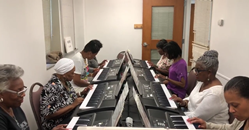
Participants of the gospel music program play Yamaha keyboards during a 45-minute instrumental session.
“Evidence is growing that church involvement, in addition to greater access to health interventions, exerts positive and diverse health benefits for African Americans,” said principal investigator, Barry Bittman, MD, CEO of the Yamaha Music and Wellness Institute.
HILTON HEAD, S.C. (PRWEB)
October 16, 2020
A new scientific study published in the journal Advances in Mind-Body Medicine illustrates, for the first time, how gospel music can effectively reduce cardiovascular health risks within the African American senior community.
Conducted over 18 months by the Yamaha Music and Wellness Institute (http://www.yamahainstitute.org), the study addresses the excessive burden of heart disease and stroke in African Americans, which accounts for the largest portion of the inequality in life expectancy between whites and blacks in the U.S., despite the existence of low-cost, highly effective preventative treatments. Mortality associated with cardiovascular disease is significantly higher in African Americans compared with people of other ethnicities, with hypertension being the single most significant risk factor in this population.
Although cardiovascular lifestyle education and self-management programs are available for the general public, many African Americans prefer to learn about health-promoting activities through interactive programs led by church ministries.
The research team focused on reducing risk factors for cardiovascular disease through the integration of a church-based program of vocal and instrumental gospel music, as a means for building interpersonal support, camaraderie, and, ultimately, program retention.
The study was performed at Rodman Street Missionary Baptist Church, Pittsburgh, Pennsylvania, involving 71 African Americans seniors. A control group of 35 participated in weekly cardiovascular risk reduction educational sessions only, while an intervention group of 36 also engaged in weekly gospel music sessions.
The intervention group participated in the gospel music program led by two musicians, who facilitated weekly 45-minute vocal and instrumental sessions. These consisted of singing and playing musical instruments, including Yamaha Clavinova digital pianos, world percussion drums and guitars. In addition to group vocal expression, the facilitators blended elements of Recreational Music Making—a group music-based activity that focuses on personal expression and group support, rather than mastery and performance—with protocols designed to establish a relaxed, non-threatening environment for creative musical expression through enjoyable, vocal, and instrumental gospel music.
Blood pressure measurements were performed biweekly. After a year, participants who took part in gospel music were more likely to continue the program and attend more sessions.
The intervention group was 4.21 times more likely to complete the intervention than the control group. A significant difference was noted in attendance, which was higher for the intervention group, at 21.3 sessions, compared with the control group, at 17.9 sessions.
The intervention group also demonstrated a statistically significant 83.3% retention rate compared with only 54.3% for the control group. Both groups clearly demonstrated improvements in systolic blood pressure to a similar degree.
The addition of the gospel music program clearly resulted in more individuals benefiting in the course of the study. Six months after completion of the program, systolic blood pressure reductions across both groups were maintained, signifying a statistically significant enduring effect.
“Evidence is growing that church involvement, in addition to greater access to health interventions, exerts positive and diverse health benefits for African Americans,” said principal investigator, Barry Bittman, MD, CEO of the Yamaha Music and Wellness Institute. “This study is the first to clearly demonstrate that the addition of an engaging Gospel music can effectively serve as a catalyst for promoting retention, engagement, and positive health outcomes.”
Dr. Darryl T. Canady, senior pastor of the Rodman Street Church noted, “I embrace the synergy and collaborative efforts of this study that served as an effective means for educating our underserved population, bolstering stronger families, and creating healthier communities.”
Gospel music facilitator, Alton Mitchell added, “as I watched this program positively affect so many lives, I was equally impressed by the interest and desire for music instruction and cohesion among the participants.”
“The addition of a gospel music program as a catalyst for increased engagement in a sustainable, healthy lifestyle program warrants further consideration,” added Bittman. “Church-centered health education and support should be prioritized, using gospel music programs to boost participation and engagement.”
To learn more about the Yamaha Music and Wellness Institute, visit http://www.yamahainstitute.org
-END-
About Yamaha Music and Wellness Institute
Yamaha Music and Wellness Institute is a not-for-profit 501(C)(3) organization dedicated to interdisciplinary development, scientific investigation, professional training and clinical amalgamation of active music participation strategies with integrative evidence-based medical insights for the purpose of enhancing quality of life for individuals of all ages regardless of race, ethnicity or disability.
Share article on social media or email:

